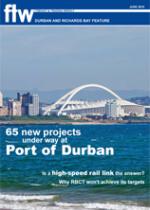There has historically been a
serious lack of communication
between the Transnet port and
rail authorities and the bulk of
port users, according to Gerald
Naidu, sales executive at SA
Inland Logistics (Sail).
“But, with this latest strike
disaster, communication has
improved,” he told FTW.
At the same time, the strike
also highlighted the collective
problem of delays at the port.
“This time it was very apparent
that there is a ripple effect right
along the supply chain – hitting
shippers/importers, forwarders,
transporters and the cargo
buyer,” Naidu added.
And Transnet finally got the
message, arranging a meeting
with Sail to hear its complaints.
“It was a positive meeting,”
said Naidu, “where they
informed us of their challenges,
and we, in turn, put our cards on
the table.
“We made it clear to them that
they should engage all parties in
the industry – and not only the
shipping lines whom they have
always treated as though they
were the only customers at the
port. But the lines actually only
control a minimal portion of
the movement of full container
traffic in and out of the port.”
Sail also made the point that
the two sides can work jointly to
alleviate the challenges currently
encountered.
“Transnet was open to the
suggestions we made,” Naidu
added, “and we will be
discussing this with our clients,
and working with the port.”
He also suggested that, where
individual voices are not being
heard on issues affecting all port
users, a combined, single voice
might be loud enough to
gain attention.
“We should have a committee
representing all the different
industry bodies to put the
point of view to Transnet,” he
said. “We have to get together
at each port to make our
voices heard.”
Transnet strike leads to improved communication
09 Jul 2010 - by Alan Peat
0 Comments
Durban 2010

09 Jul 2010
09 Jul 2010
09 Jul 2010
09 Jul 2010
09 Jul 2010
09 Jul 2010
09 Jul 2010
09 Jul 2010
09 Jul 2010
09 Jul 2010
09 Jul 2010
09 Jul 2010
Border Beat
Featured Jobs
New
New
New
